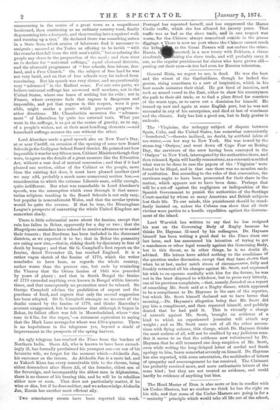Lord Warwick has written to say that he has resigned
his seat on the Governing Body of Rugby because he thinks Dr. Hayman ill-used by his colleagues. Dr. Hayman himself has been writing a good deal to the Times since our last issue, and has announced his intention of trying to get a mandamus or other legal remedy against the Governing Body, but in this threat, as in other things, he is no doubt ill- advised. His letters have added nothing to the conditions, of the question under discussion, except that they have shown that when he at last, under much stress of circumateuices, fully and frankly retracted all his charges against Mr. Scott, and expressed his wish to co-operate cordially with him for the future, he was not in the least disposed to withdraw, but to press very bitterly, one of his previous complaints, —that, namely,founded on a report of something Mr. Scott said at a Rugby dinner, which appeared to be a compliment to Dr. Hayman in the ears of the reporter, but which Mr. Scott himself declared not to have borne that meaning,—Dr. Heyman's allegation being that Mr. Scott did pay him a compliment, and then repented himself, and publicly denied that he had paid it. This is virtually a charge of untruth against Mr. Scott, brought on evidence of a kind to which no experienced journalist will attach any weight ; and as Mr. Scott came out of all the other accusa- tions with flying colours, this charge, which Dr. Hayman thinks the most serious of all, will not be credited by any judicious man. But it seems to us that the evidence now volunteered by Dr. Hayman that he still treasured one deep suspicion of Mr. Scott, even while writing the long-delayed letter of cordial and frank apology to him, bears somewhat severely on himself. Dr. Hayman has also reported, with some ostentation, the multitudes of letters of sympathy and encouragement he has received. The Claimant has probably received more, and more enthusiastic letters of the same kind ; but they are not treated as evidence, and could hardly be evidence of anything but bias.










































 Previous page
Previous page